Unit 9 Have you ever been to a museum? Section A阅读课件+嵌入音视频(共57张PPT)
文档属性
| 名称 | Unit 9 Have you ever been to a museum? Section A阅读课件+嵌入音视频(共57张PPT) | 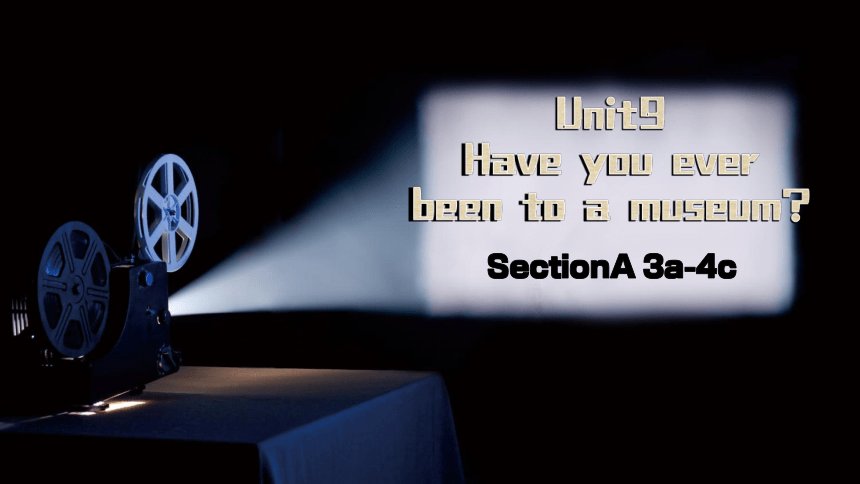 | |
| 格式 | pptx | ||
| 文件大小 | 147.6MB | ||
| 资源类型 | 教案 | ||
| 版本资源 | 人教新目标(Go for it)版 | ||
| 科目 | 英语 | ||
| 更新时间 | 2022-08-25 15:23:40 | ||
图片预览

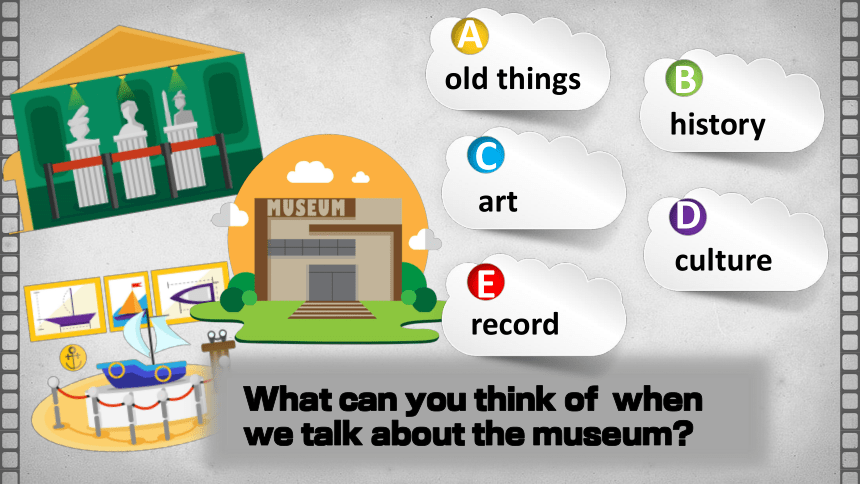
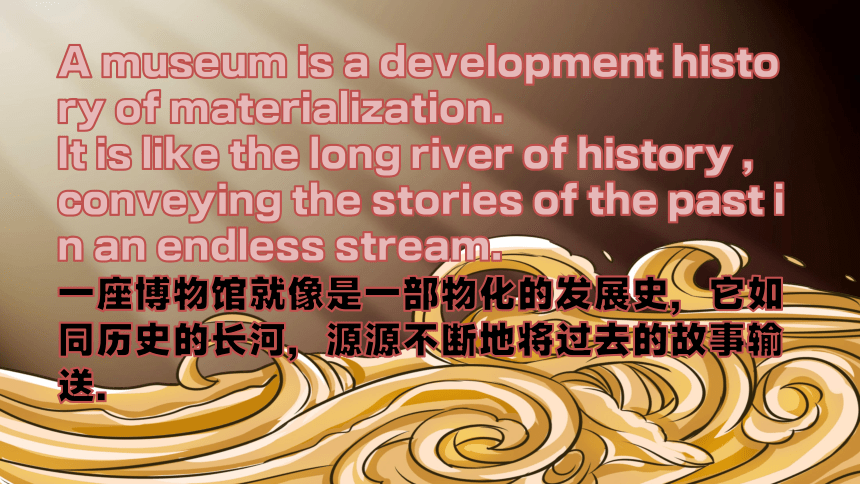
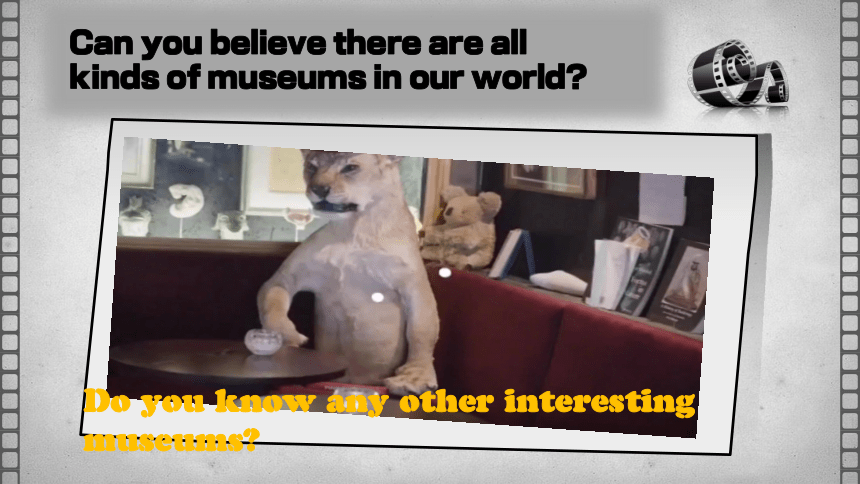
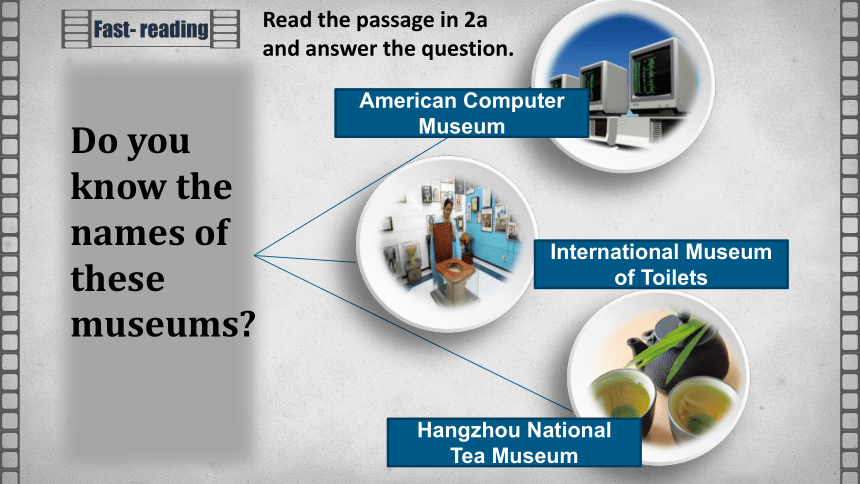
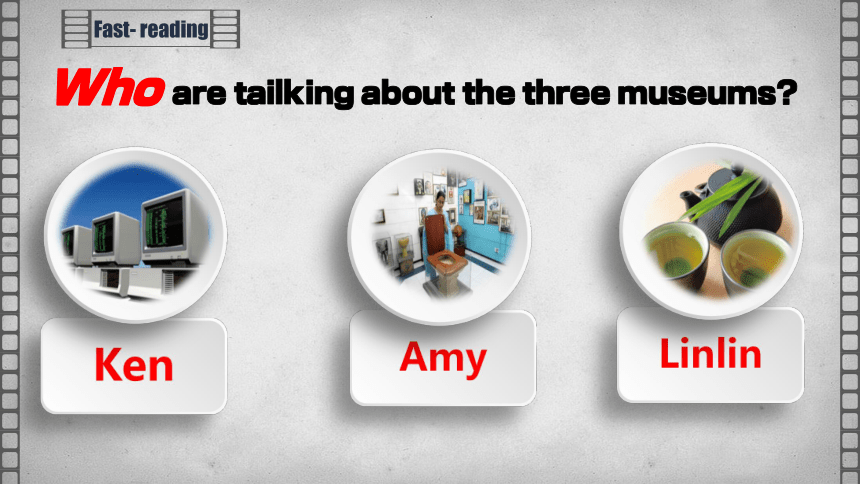
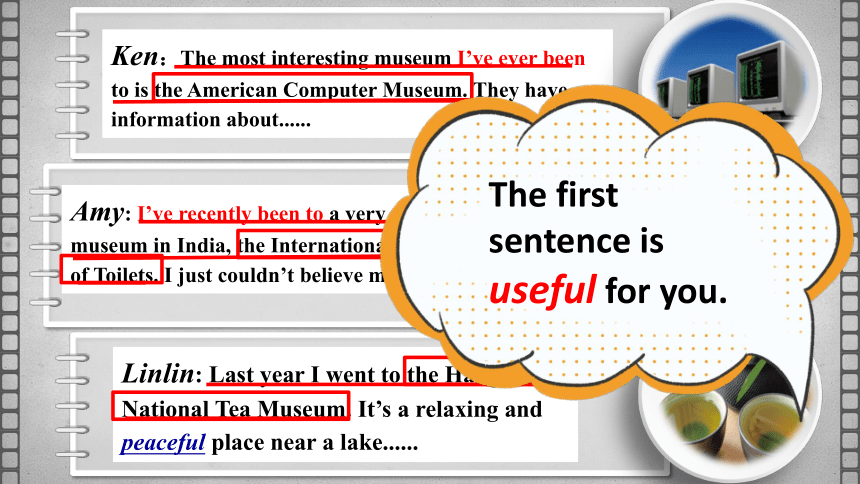
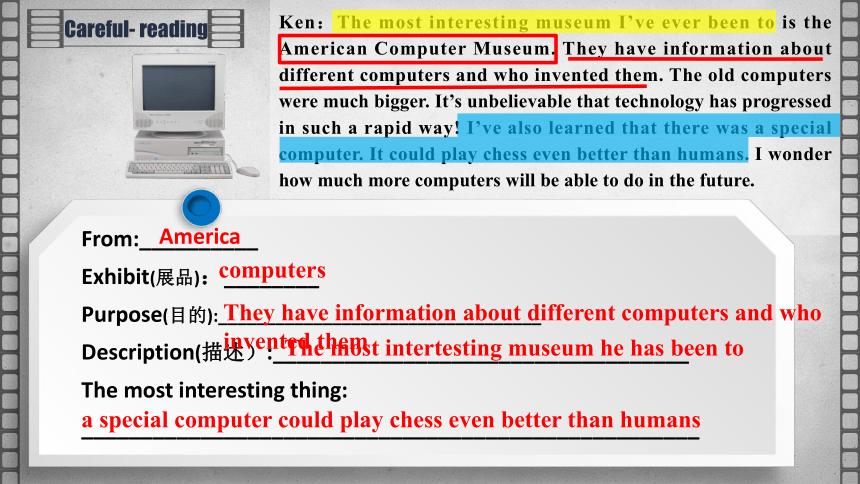
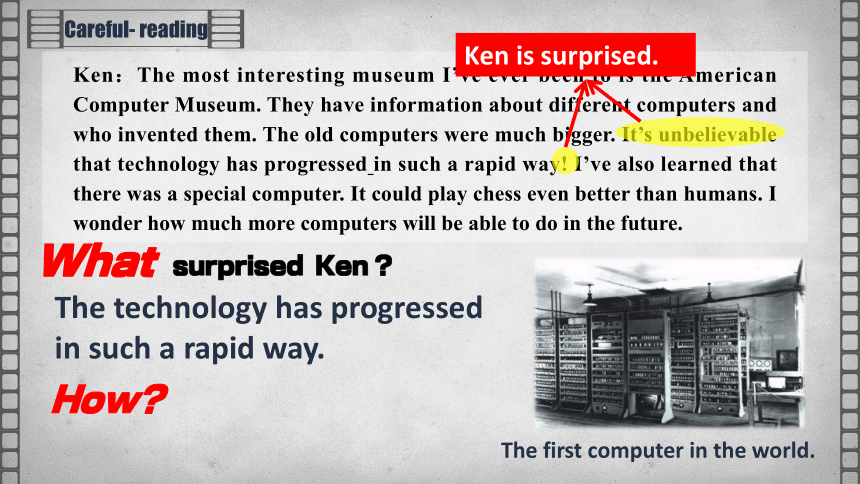
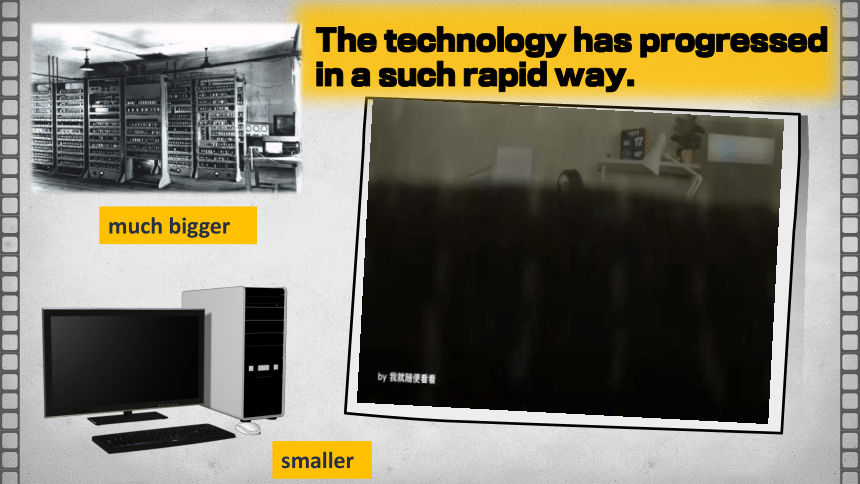
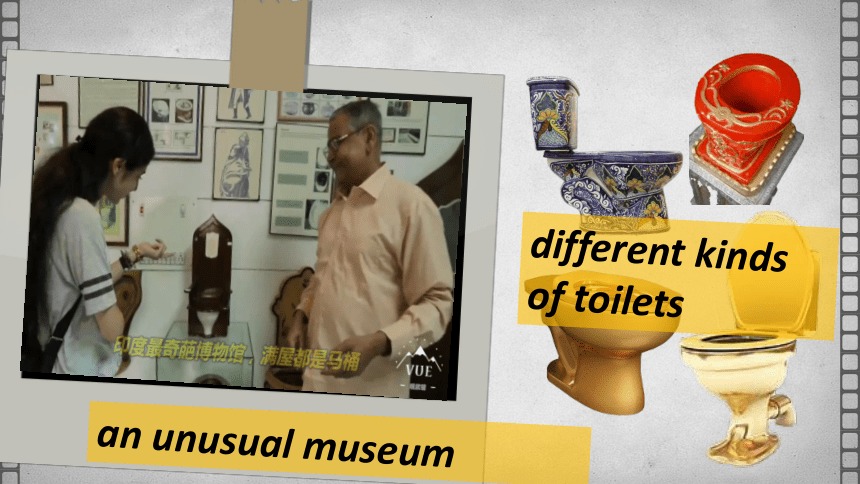
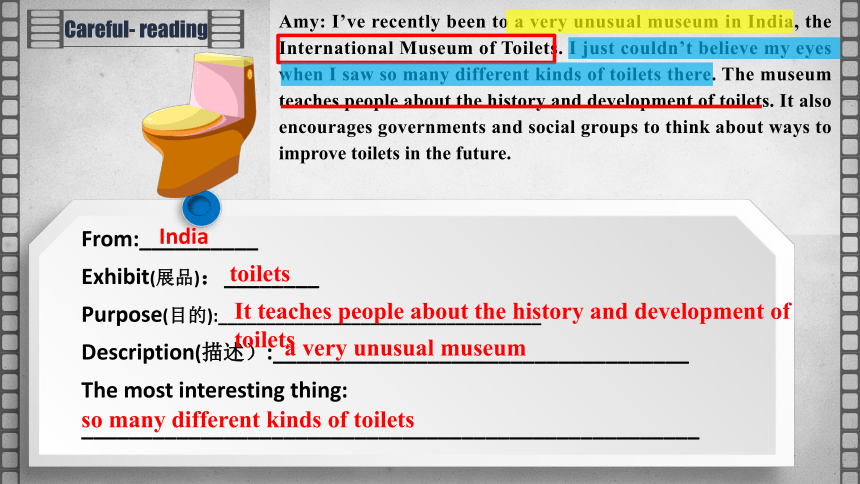
文档简介
(共57张PPT)
SectionA 3a-4c
Unit9
Have you ever
been to a museum
What can you think of when we talk about the museum
A
old things
B
history
C
art
D
culture
E
record
一座博物馆就像是一部物化的发展史,它如同历史的长河,源源不断地将过去的故事输送.
A museum is a development history of materialization.
It is like the long river of history ,
conveying the stories of the past in an endless stream.
Can you believe there are all kinds of museums in our world
Do you know any other interesting museums
Do you know the names of these museums
American Computer Museum
International Museum of Toilets
Hangzhou National Tea Museum
Fast- reading
Read the passage in 2a and answer the question.
Linlin
Amy
Ken
Fast- reading
Who are tailking about the three museums
Ken:The most interesting museum I’ve ever been to is the American Computer Museum. They have information about......
Amy: I’ve recently been to a very unusual museum in India, the International Museum of Toilets. I just couldn’t believe my eyes......
Linlin: Last year I went to the Hangzhou National Tea Museum. It’s a relaxing and peaceful place near a lake......
The first sentence is useful for you.
Ken:The most interesting museum I’ve ever been to is the American Computer Museum. They have information about different computers and who invented them. The old computers were much bigger. It’s unbelievable that technology has progressed in such a rapid way! I’ve also learned that there was a special computer. It could play chess even better than humans. I wonder how much more computers will be able to do in the future.
Careful- reading
From:__________
Exhibit(展品):________
Purpose(目的):__________________________________
Description(描述):___________________________________
The most interesting thing:
____________________________________________________
America
computers
The most intertesting museum he has been to
a special computer could play chess even better than humans
They have information about different computers and who invented them
Careful- reading
Ken:The most interesting museum I’ve ever been to is the American Computer Museum. They have information about different computers and who invented them. The old computers were much bigger. It’s unbelievable that technology has progressed in such a rapid way! I’ve also learned that there was a special computer. It could play chess even better than humans. I wonder how much more computers will be able to do in the future.
Ken is surprised.
What surprised Ken
The technology has progressed
in such a rapid way.
How
The first computer in the world.
The technology has progressed in a such rapid way.
much bigger
smaller
an unusual museum
different kinds of toilets
Amy: I’ve recently been to a very unusual museum in India, the International Museum of Toilets. I just couldn’t believe my eyes when I saw so many different kinds of toilets there. The museum teaches people about the history and development of toilets. It also encourages governments and social groups to think about ways to improve toilets in the future.
Careful- reading
From:__________
Exhibit(展品):________
Purpose(目的):__________________________________
Description(描述):___________________________________
The most interesting thing:
____________________________________________________
India
toilets
a very unusual museum
so many different kinds of toilets
It teaches people about the history and development of
toilets
Careful- reading
From the Para 2 , what does the museum encourage
governments and soical groups to do
It encourages governments and social groups to think about ways to improve toilets in the future.
Can you give some advice to
improve toilets in the future
Maybe the toilets in the future.
the Hangzhou National Tea Museum
What do you think of this place?
It is a relaxing and
peaceful place.
How much do you know about the tea art performances
tea art performance
tea sets
Careful- reading
Linlin: Last year I went to the Hangzhou National Tea Museum. It’s a relaxing and peaceful place near a lake. The tea art performances show how to make a perfect cup of tea with beautiful tea sets. Watching the tea preparation is just as enjoyable as drinking the tea itself. I’ve finally realized why my grandpa loves drinking tea and collecting tea sets.
From:__________
Exhibit(展品):________
Purpose(目的):__________________________________
Description(描述):___________________________________
The most interesting thing:
____________________________________________________
Hangzhou
tea
It is a relaxing and peaceful place near a lake
Watching the tea preparation is just as enjoyable as drinking the tea itself.
The tea art performances show how to make a perfect cup
of tea with beautiful tea sets.
What can we learn from
the Hangzhou National
Tea Museum?
Tea art performance
Types of tea
The experience of beauty
Attitude towards life
Chinese traditional culture
That’s why the museum is set up
From three museums,they all told
us the same thing ——————
culture
Discussion
The exhibits in the museums are all old things, is it necessary
to protect them
the cultural record
the cultural inheritance
(传承)
Do you think museums are helpful for your future life?
Museums are bridges connecting the past ,the present and the future. They play a special role in promoting (促进)exchanges (交流)and mutual(共同的) learning among the civilizations(文明).
Summary
How to introduce a museum
Name
I have been to......
It is in......
It is a very......
I couldn't believe ...... when I saw......
The museum teaches......
It also encourages......
where
Description
(描述)
The most interesting thing
What can you learn
Summary
How to introduce a museum
Name
where
Description
(描述)
The most interesting thing
What can you learn
Choose a museum you like and
introduce it by your own words.
3b
Check the answers.
1. What does Ken say about the American Computer Museum
(1) It is the most interesting museum he has ever been to.
(2) It has information about different computers and who invented them,
(3) He learned that there was a special computer that plays chess better than humans.
3b
Check the answers.
2. What can we learn at the International Museum of Toilets
(1) We can learn about the history and development of toilets.
(2)It also encourages goverments and social groups
to think about ways to improve toilets in the future.
3b
Check the answers.
3. Why is the Hangzhou National Tea Museum a nice place to enjoy tea
It is a nice place to enjoy tea because it is a relaxing and peaceful place near a lake. Watching tea art performances is also enjoyable.
3c
Which of the underlined words in the passage have the following meaning
make (something) better
become better uncommon
quiet
made
quick
invented
rapid
unusual
improve
progress
peaceful
underlined words
Language points
Language points
1.They have information about different computers and who invented them.
invent : v. 发明
invention: n. 发明
(即可数又不可数)
inventor: n. 发明家
inventor
invention
Edison invented the light bulb.
2. It’s unbelievable that technology has progressed in such a rapid way!
拓展:
It is unbelievable that + 句子
令人不敢相信的是.......
believe : v. 相信 , 信任
believable : adj. 可相信的
unbelievable : adj : 不可相信的
2. It’s unbelievable that technology has progressed in such a rapid way!
progress : n. 进步
拓展:
make progress 取得进步
make + adj (rapid/great) progress 取得...的进步
快速的方式
progress : v. 进展,进步
2. It’s unbelievable that technology has progressed in such a rapid way!
such 如此的,这样的
1. such + a/an + adj. + 单数名词
such an interesting book
2. such + adj. + 名词 复数
such beautiful flowers
3. such + adj. + 不可数名词
such delicious food
so 如此,这样
1. so + adj./adv
so popular
2. so + adj. + a/an + n.
so clever a boy
3. so + many/few+可数名词复数
so few books
4. so +much/little+不可数名词
so little money
3. I’ve recently been to a very unusual museum in India, the International Museum of Toilets.
unusual : 不一般的
un- : 表示否定意义的前缀,通常放在形容词之前。
unabled 不可能的
unhappy 不快乐的
uncertain 不确定的
3. I wonder how much more computers will be
able to do in the future.
wonder 表示“(对某事)感到疑惑;想要知道;想弄明白;琢磨”,
后面常接由what, how, who或if / whether (是否)引导的宾语从句。
I wonder + what/ how/who/if/whether + 从句
汉翻英: 我想知道他是谁?
I wonder who she is?
4. It also encourages governments and social groups to think about ways to improvetoilets in the future.
encourage 及物动词 意为 “鼓励”
encourage sb to do sth
鼓励某人做某事
汉翻英: 我的老师经常鼓励我要努力学习.
My teacher often encourages me to study hard.
〖构词〗
encourage
= en- + courage
en- (前缀)
“使.....成为某种状态”
同类型:
enlarge 使扩大
enable 使能够
endanger 使遭受危险
6. Watching the tea preparation is just as enjoyable as drinking the tea itself.
watching the tea preparation
此处是动名词短语在句中充当主语。
动名词:动词原形+ ing
汉翻英:上大学是那个小男孩的梦想.
Going to the college is the little boy's dream.
〖构词〗
enjoyable
= enjoy + -able
-able (后缀) ,一般位于动词之后
“可...的” “能够...的”
readable (可读的)
useable (可用的;可使用的)
5. I've finally realized why my grandpa loves drinking tea and collecting tea sets.
why 引导宾语从句
翻译: 我终于意识到为什么我的爷爷那么喜欢喝茶和收集茶具了.
Grammar
Focus
Where have you been
I have been to ......
Have you been to.....
Yes, I have.
No, I haven't.
Complete the sentences.
你去过科学博物馆吗?
______ you ever _____ _____ a science museum .
肯定回答: 是的,我去过。
Yes, ____ _____ ____ a science museum.
Have
否定回答: 不,我没去过。
No, ____ _____ _____ _____ a science museum.
been
to
I've
been
to
I've
never
been
to
Complete the sentences.
2.你去过太空博物馆吗?
______ you ever _____ _____ a space museum .
肯定回答: 是的,我去年去过了。
Yes, ____ _____ ______ last year.
否定回答: 不,我没去过。
No, ____ _____ .
visited
to
Have
I
went
there
I
haven't
Complete the sentences.
3. 我去过艺术博物馆很多次了
____ _____ ____ the art museum many times.
我也是。我还去参观过自然博物馆
Me, too. And _____ ______ _______ the nature museum.
I've
been
to
I've
also
visited
Complete the sentences.
4. 我从来没有去过水上乐园.
______ ______ _____ ______ a water park.
我也没有。
Me, neither.
I've
never
been
to
现在完成时 Present perfect tense
1.定义:
表示过去发生或已经完成的某一动作对现在
造成的影响或结果。
2. 构成:
1. 肯定句
“have (has)+过去分词
2. 否定句:
haven’t(hasn’t)+过去分词
3. 疑问句:
是把助动词have或has提到主语之前。
回答用Yes, …have (has). /No, …haven’t (hasn’t).
3. 时间状语:
already, yet, ever, never,
just, before, several times 等。
1. never “从来没有,从不”,表示否定。
2. ever “曾经”,主要用于疑问句。
注意:never, ever
一般置于助动词
have/ has之后,
过去分词之前。
一般过去时
现在完成时
I have seen the film.
我看过这部电影。
I saw the film last month.
我上个月看了这部电影。
我了解这部
电影的内容。
只说明上星期看
了这部电影,不涉
及现在的情况
一般过去时
现在完成时
只强调过去的动作
强调过去的事情对现在的影响
表示过去的时间状语连用
不能与表示过去的时间状语连用
表示过去的经历
过去的动作或状态延续到现在
并可能持续下去
yesterday, last week, … ago, in1980
for, since, ever, never, just, already, yet,
Put the correct forms of the verbs in the blanks.
4a
1. A: Do you want __________ (come) to the
space museum
B: No, I’ve already ______ (be) there three
times.
2. A: Have you ________ (see) the robots at the
science museum
B: Yes, I ______ (go) there last weekend.
to come
been
seen
went
3. A: Let’s ________ (spend) the day at the zoo.
B: Well, I’ve already _______ (be) there a
couple of times, but I’m happy______(go) again.
4. A: How about _________ (go) to the art museum
There are some special German paintings there
right now.
B: Sure. When do you want _______ (go)
5. A: Have you ever _________ (visit) the history
museum
B:No, I’ve never________ (be) there.
spend
been
to go
going
to go
visited
been
Most of us _____________ (see) Mickey Mouse,
Donald Duck and other famous Disney characters
in cartoons before. But have you ever ________
(be) to Disneyland Disneyland ______ (be)
an amusement park with a special theme —Disney characters and movies. There ______
(be) many exciting rides, lovely restaurants
and fantastic gift shops there. You
4b
have seen
been
is
are
主题
can also ______ (see) the Disney characters
walking around the park. And have you ever_______ (hear) of a Disney Cruise This ___ (be) a boat ride with a Disney theme. You can _______ (take) a ride on the boat for several days and eat and sleep on it. On the boat, you can _______(shop) and have Disney parties before you _________ (arrive) at the Disney island.
see
heard
is
take
shop
arrive
迪士尼游轮
Answer the survey questions and then ask your partner.
Have you ever… You Your partner
been to another province in China
lost something important
4c
Exercise
1. --_____ you ever _____ to a water park
--Yes, we had a good time there.
A. Have, gone B. Had, been C. Have, been
2. I _____ my grandpa last Sunday.
A. have visited B. visited C. was visiting
3. She _____ Shanghai for a month.
A. has come to B. came to C. has been in
C
B
C
Exercise
4. Fanny _____ TV at this time last Saturday.
A. has watched B. was watching C. watched
5. --Have you ____ been to our town before
--No, it’s the first time I ____ here.
A. even, have come B. ever, come
C. ever, have come
B
C
Welcome to the museum of the museum
SectionA 3a-4c
Unit9
Have you ever
been to a museum
What can you think of when we talk about the museum
A
old things
B
history
C
art
D
culture
E
record
一座博物馆就像是一部物化的发展史,它如同历史的长河,源源不断地将过去的故事输送.
A museum is a development history of materialization.
It is like the long river of history ,
conveying the stories of the past in an endless stream.
Can you believe there are all kinds of museums in our world
Do you know any other interesting museums
Do you know the names of these museums
American Computer Museum
International Museum of Toilets
Hangzhou National Tea Museum
Fast- reading
Read the passage in 2a and answer the question.
Linlin
Amy
Ken
Fast- reading
Who are tailking about the three museums
Ken:The most interesting museum I’ve ever been to is the American Computer Museum. They have information about......
Amy: I’ve recently been to a very unusual museum in India, the International Museum of Toilets. I just couldn’t believe my eyes......
Linlin: Last year I went to the Hangzhou National Tea Museum. It’s a relaxing and peaceful place near a lake......
The first sentence is useful for you.
Ken:The most interesting museum I’ve ever been to is the American Computer Museum. They have information about different computers and who invented them. The old computers were much bigger. It’s unbelievable that technology has progressed in such a rapid way! I’ve also learned that there was a special computer. It could play chess even better than humans. I wonder how much more computers will be able to do in the future.
Careful- reading
From:__________
Exhibit(展品):________
Purpose(目的):__________________________________
Description(描述):___________________________________
The most interesting thing:
____________________________________________________
America
computers
The most intertesting museum he has been to
a special computer could play chess even better than humans
They have information about different computers and who invented them
Careful- reading
Ken:The most interesting museum I’ve ever been to is the American Computer Museum. They have information about different computers and who invented them. The old computers were much bigger. It’s unbelievable that technology has progressed in such a rapid way! I’ve also learned that there was a special computer. It could play chess even better than humans. I wonder how much more computers will be able to do in the future.
Ken is surprised.
What surprised Ken
The technology has progressed
in such a rapid way.
How
The first computer in the world.
The technology has progressed in a such rapid way.
much bigger
smaller
an unusual museum
different kinds of toilets
Amy: I’ve recently been to a very unusual museum in India, the International Museum of Toilets. I just couldn’t believe my eyes when I saw so many different kinds of toilets there. The museum teaches people about the history and development of toilets. It also encourages governments and social groups to think about ways to improve toilets in the future.
Careful- reading
From:__________
Exhibit(展品):________
Purpose(目的):__________________________________
Description(描述):___________________________________
The most interesting thing:
____________________________________________________
India
toilets
a very unusual museum
so many different kinds of toilets
It teaches people about the history and development of
toilets
Careful- reading
From the Para 2 , what does the museum encourage
governments and soical groups to do
It encourages governments and social groups to think about ways to improve toilets in the future.
Can you give some advice to
improve toilets in the future
Maybe the toilets in the future.
the Hangzhou National Tea Museum
What do you think of this place?
It is a relaxing and
peaceful place.
How much do you know about the tea art performances
tea art performance
tea sets
Careful- reading
Linlin: Last year I went to the Hangzhou National Tea Museum. It’s a relaxing and peaceful place near a lake. The tea art performances show how to make a perfect cup of tea with beautiful tea sets. Watching the tea preparation is just as enjoyable as drinking the tea itself. I’ve finally realized why my grandpa loves drinking tea and collecting tea sets.
From:__________
Exhibit(展品):________
Purpose(目的):__________________________________
Description(描述):___________________________________
The most interesting thing:
____________________________________________________
Hangzhou
tea
It is a relaxing and peaceful place near a lake
Watching the tea preparation is just as enjoyable as drinking the tea itself.
The tea art performances show how to make a perfect cup
of tea with beautiful tea sets.
What can we learn from
the Hangzhou National
Tea Museum?
Tea art performance
Types of tea
The experience of beauty
Attitude towards life
Chinese traditional culture
That’s why the museum is set up
From three museums,they all told
us the same thing ——————
culture
Discussion
The exhibits in the museums are all old things, is it necessary
to protect them
the cultural record
the cultural inheritance
(传承)
Do you think museums are helpful for your future life?
Museums are bridges connecting the past ,the present and the future. They play a special role in promoting (促进)exchanges (交流)and mutual(共同的) learning among the civilizations(文明).
Summary
How to introduce a museum
Name
I have been to......
It is in......
It is a very......
I couldn't believe ...... when I saw......
The museum teaches......
It also encourages......
where
Description
(描述)
The most interesting thing
What can you learn
Summary
How to introduce a museum
Name
where
Description
(描述)
The most interesting thing
What can you learn
Choose a museum you like and
introduce it by your own words.
3b
Check the answers.
1. What does Ken say about the American Computer Museum
(1) It is the most interesting museum he has ever been to.
(2) It has information about different computers and who invented them,
(3) He learned that there was a special computer that plays chess better than humans.
3b
Check the answers.
2. What can we learn at the International Museum of Toilets
(1) We can learn about the history and development of toilets.
(2)It also encourages goverments and social groups
to think about ways to improve toilets in the future.
3b
Check the answers.
3. Why is the Hangzhou National Tea Museum a nice place to enjoy tea
It is a nice place to enjoy tea because it is a relaxing and peaceful place near a lake. Watching tea art performances is also enjoyable.
3c
Which of the underlined words in the passage have the following meaning
make (something) better
become better uncommon
quiet
made
quick
invented
rapid
unusual
improve
progress
peaceful
underlined words
Language points
Language points
1.They have information about different computers and who invented them.
invent : v. 发明
invention: n. 发明
(即可数又不可数)
inventor: n. 发明家
inventor
invention
Edison invented the light bulb.
2. It’s unbelievable that technology has progressed in such a rapid way!
拓展:
It is unbelievable that + 句子
令人不敢相信的是.......
believe : v. 相信 , 信任
believable : adj. 可相信的
unbelievable : adj : 不可相信的
2. It’s unbelievable that technology has progressed in such a rapid way!
progress : n. 进步
拓展:
make progress 取得进步
make + adj (rapid/great) progress 取得...的进步
快速的方式
progress : v. 进展,进步
2. It’s unbelievable that technology has progressed in such a rapid way!
such 如此的,这样的
1. such + a/an + adj. + 单数名词
such an interesting book
2. such + adj. + 名词 复数
such beautiful flowers
3. such + adj. + 不可数名词
such delicious food
so 如此,这样
1. so + adj./adv
so popular
2. so + adj. + a/an + n.
so clever a boy
3. so + many/few+可数名词复数
so few books
4. so +much/little+不可数名词
so little money
3. I’ve recently been to a very unusual museum in India, the International Museum of Toilets.
unusual : 不一般的
un- : 表示否定意义的前缀,通常放在形容词之前。
unabled 不可能的
unhappy 不快乐的
uncertain 不确定的
3. I wonder how much more computers will be
able to do in the future.
wonder 表示“(对某事)感到疑惑;想要知道;想弄明白;琢磨”,
后面常接由what, how, who或if / whether (是否)引导的宾语从句。
I wonder + what/ how/who/if/whether + 从句
汉翻英: 我想知道他是谁?
I wonder who she is?
4. It also encourages governments and social groups to think about ways to improvetoilets in the future.
encourage 及物动词 意为 “鼓励”
encourage sb to do sth
鼓励某人做某事
汉翻英: 我的老师经常鼓励我要努力学习.
My teacher often encourages me to study hard.
〖构词〗
encourage
= en- + courage
en- (前缀)
“使.....成为某种状态”
同类型:
enlarge 使扩大
enable 使能够
endanger 使遭受危险
6. Watching the tea preparation is just as enjoyable as drinking the tea itself.
watching the tea preparation
此处是动名词短语在句中充当主语。
动名词:动词原形+ ing
汉翻英:上大学是那个小男孩的梦想.
Going to the college is the little boy's dream.
〖构词〗
enjoyable
= enjoy + -able
-able (后缀) ,一般位于动词之后
“可...的” “能够...的”
readable (可读的)
useable (可用的;可使用的)
5. I've finally realized why my grandpa loves drinking tea and collecting tea sets.
why 引导宾语从句
翻译: 我终于意识到为什么我的爷爷那么喜欢喝茶和收集茶具了.
Grammar
Focus
Where have you been
I have been to ......
Have you been to.....
Yes, I have.
No, I haven't.
Complete the sentences.
你去过科学博物馆吗?
______ you ever _____ _____ a science museum .
肯定回答: 是的,我去过。
Yes, ____ _____ ____ a science museum.
Have
否定回答: 不,我没去过。
No, ____ _____ _____ _____ a science museum.
been
to
I've
been
to
I've
never
been
to
Complete the sentences.
2.你去过太空博物馆吗?
______ you ever _____ _____ a space museum .
肯定回答: 是的,我去年去过了。
Yes, ____ _____ ______ last year.
否定回答: 不,我没去过。
No, ____ _____ .
visited
to
Have
I
went
there
I
haven't
Complete the sentences.
3. 我去过艺术博物馆很多次了
____ _____ ____ the art museum many times.
我也是。我还去参观过自然博物馆
Me, too. And _____ ______ _______ the nature museum.
I've
been
to
I've
also
visited
Complete the sentences.
4. 我从来没有去过水上乐园.
______ ______ _____ ______ a water park.
我也没有。
Me, neither.
I've
never
been
to
现在完成时 Present perfect tense
1.定义:
表示过去发生或已经完成的某一动作对现在
造成的影响或结果。
2. 构成:
1. 肯定句
“have (has)+过去分词
2. 否定句:
haven’t(hasn’t)+过去分词
3. 疑问句:
是把助动词have或has提到主语之前。
回答用Yes, …have (has). /No, …haven’t (hasn’t).
3. 时间状语:
already, yet, ever, never,
just, before, several times 等。
1. never “从来没有,从不”,表示否定。
2. ever “曾经”,主要用于疑问句。
注意:never, ever
一般置于助动词
have/ has之后,
过去分词之前。
一般过去时
现在完成时
I have seen the film.
我看过这部电影。
I saw the film last month.
我上个月看了这部电影。
我了解这部
电影的内容。
只说明上星期看
了这部电影,不涉
及现在的情况
一般过去时
现在完成时
只强调过去的动作
强调过去的事情对现在的影响
表示过去的时间状语连用
不能与表示过去的时间状语连用
表示过去的经历
过去的动作或状态延续到现在
并可能持续下去
yesterday, last week, … ago, in1980
for, since, ever, never, just, already, yet,
Put the correct forms of the verbs in the blanks.
4a
1. A: Do you want __________ (come) to the
space museum
B: No, I’ve already ______ (be) there three
times.
2. A: Have you ________ (see) the robots at the
science museum
B: Yes, I ______ (go) there last weekend.
to come
been
seen
went
3. A: Let’s ________ (spend) the day at the zoo.
B: Well, I’ve already _______ (be) there a
couple of times, but I’m happy______(go) again.
4. A: How about _________ (go) to the art museum
There are some special German paintings there
right now.
B: Sure. When do you want _______ (go)
5. A: Have you ever _________ (visit) the history
museum
B:No, I’ve never________ (be) there.
spend
been
to go
going
to go
visited
been
Most of us _____________ (see) Mickey Mouse,
Donald Duck and other famous Disney characters
in cartoons before. But have you ever ________
(be) to Disneyland Disneyland ______ (be)
an amusement park with a special theme —Disney characters and movies. There ______
(be) many exciting rides, lovely restaurants
and fantastic gift shops there. You
4b
have seen
been
is
are
主题
can also ______ (see) the Disney characters
walking around the park. And have you ever_______ (hear) of a Disney Cruise This ___ (be) a boat ride with a Disney theme. You can _______ (take) a ride on the boat for several days and eat and sleep on it. On the boat, you can _______(shop) and have Disney parties before you _________ (arrive) at the Disney island.
see
heard
is
take
shop
arrive
迪士尼游轮
Answer the survey questions and then ask your partner.
Have you ever… You Your partner
been to another province in China
lost something important
4c
Exercise
1. --_____ you ever _____ to a water park
--Yes, we had a good time there.
A. Have, gone B. Had, been C. Have, been
2. I _____ my grandpa last Sunday.
A. have visited B. visited C. was visiting
3. She _____ Shanghai for a month.
A. has come to B. came to C. has been in
C
B
C
Exercise
4. Fanny _____ TV at this time last Saturday.
A. has watched B. was watching C. watched
5. --Have you ____ been to our town before
--No, it’s the first time I ____ here.
A. even, have come B. ever, come
C. ever, have come
B
C
Welcome to the museum of the museum
同课章节目录
- Unit 1 What's the matter?
- Section A
- Section B
- Unit 2 I'll help to clean up the city parks.
- Section A
- Section B
- Unit 3 Could you please clean your room?
- Section A
- Section B
- Unit 4 Why don't you talk to your parents?
- Section A
- Section B
- Unit 5 What were you doing when the rainstorm came
- Section A
- Section B
- Review of Units 1-5
- Unit 6 An old man tried to move the mountains.
- Section A
- Section B
- Unit 7 What's the highest mountain in the world?
- Section A
- Section B
- Unit 8 Have you read Treasure Island yet?
- Section A
- Section B
- Unit 9 Have you ever been to a museum?
- Section A
- Section B
- Unit 10 I've had this bike for three years.
- Section A
- Section B
